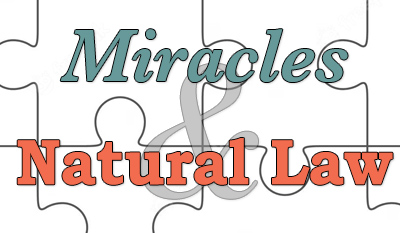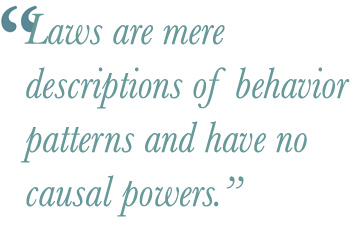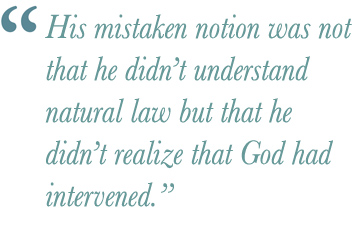[Note: For a more comprehensive discussion of miracles, see the TIBP article: “A Christian Defense of Biblical Miracles.”]
Background
Many people believe that the laws of physics control everything in our universe. If this is true, these laws must govern everything that happens, and therefore, the miracles described in the Bible are either not possible or must be attributable solely to the laws of nature.
Several definitions of miracles are consistent with Christian theism. For example, the late Christian apologist C. S. Lewis defined miracles as “an interference with Nature by supernatural power.”[1] The question that naturally arises from such a definition is: Can God interfere with the laws of nature or are the laws fixed and unchanging, thereby rendering miracles impossible?
Benedict de Spinoza (1632–1677) understood miracles as violations of natural law.[2] He argued that nothing can violate the laws of nature since they are immutable (i.e., fixed, set, unchanging). Therefore, if miracles (purportedly) violate the laws of nature, then miracles are impossible.
The first problem is that Spinoza’s argument begs the question.[3] If Spinoza knew that it is impossible to violate natural laws, then he would have known that miracles cannot happen. However, there is no way for anyone to know that natural laws are fixed and unchanging. Unless one knows everything there is to know, one cannot know with certainty that natural laws are immutable and, thus, that miracles are impossible. Instead, Spinoza assumed that natural laws are unchanging and, therefore, that miracles must be impossible. However, such assumptions cannot justify themselves.
Natural Laws are not Causal
C. S. Lewis distinguished between the laws of nature and the events that conform to the laws. Events are the things that obey laws, and laws are the patterns to which the events conform.[4] When one billiard ball sets another in motion, Newton’s laws describe and predict the relationship between the motion and forces acting on the balls. However, the “law” does not put the balls in motion; a man with a cue stick does that. As we look around nature, we find that natural laws never produce a single event.[5] Laws are mere descriptions of behavior patterns and have no causal powers. Therefore, something other than the laws of nature causes the events.
Miracles May be Interventions into Nature
The laws of nature tell us what a billiard ball will do when struck, provided no one interferes. But what if someone impedes the path of the ball as it moves across the table, causing it to deflect? In such a case, no law was violated. Instead, there was interference from within the system. Similarly, God may intervene indirectly from within (using secondary causes), or he may intervene directly from outside the system. In either case, unless one shows that a system is causally closed, one has little recourse but to acknowledge the possibility of miracles.[6]
Moreover, interfering with natural law is not the same as violating a law. John Lennox uses the example of a man who puts $1,000 in his dresser drawer one day and then adds another $1,000 the following week. The laws of arithmetic allow him to predict that he will have $2,000 in his drawer. But suppose the next time he looks in the drawer, there is only $500. Clearly, someone has intervened and stolen $1,500! Does he complain that the laws of arithmetic have been broken? No. Although he may very well complain that the laws of the United States were broken.[7]
Were Ancient Humans Ignorant of Natural Laws?
Some would have us believe that people in biblical times were more apt to trust in miracles simply because they were ignorant of the laws of nature. In other words, had they understood physical laws, they would have correctly attributed all supposed supernatural events to natural causes.[8] While it is clear that ancient humans knew much less than we do about the natural order, it seems just as evident that they could readily see the difference between the uniform features expected in nature and exceptions to such patterns. They knew that dead people don’t come back to life; they also understood that wounds and diseases don’t spontaneously heal or become cured. It is only because of the regularity of nature that biblical characters could interpret miracles as interventions by God.
None of the claims of “miracles” would have had relevance outside of the consistency, regularity, and patterns that were evident in the world. The point is that a miracle claim presupposes some knowledge of a natural order. There must be order and regularity in nature for there to be exceptions.
In New Testament times, Joseph vividly displayed his understanding of natural law through his reaction to the unexpected pregnancy of Mary. Joseph rightly understood that according to the regularities observed in nature, conception and pregnancy required intercourse.[9] The Gospel of Matthew tells us that Mary “was found to be pregnant through the Holy Spirit” (Matt. 1:18–19 [NASB]). The fact that Joseph had not come together with Mary could, in his mind, mean only one thing: infidelity. Thus, Joseph desired to divorce Mary quietly. His mistaken notion was not that he didn’t understand natural law but that he didn’t realize that God had intervened. Though early man’s knowledge of the laws of nature was, no doubt, incomplete, he nevertheless knew enough to understand that there were recurring patterns in nature and that any interruption of these patterns was an exception to the rule.
Conclusion
In summary, biblical miracles represent an interference with Nature by a supernatural power. Physical laws have no causal powers, and therefore, there is no indication that miraculous events necessarily violate these laws. An omnipotent God could only violate the laws of nature if he was somehow subject to the laws. However, the Creator cannot be held hostage by his creation. Thus, there is no incompatibility between supernatural miracles and natural laws. Finally, the ancients were aware of the natural order of things, albeit to a lesser degree than modern humans. Thus, in many cases, they should have been able to distinguish between events that conformed to the regularity and pattern in nature and those that did not.
About the Author
David P. Diaz, Ed.D., is an independent researcher and retired college professor. His writings have ranged from peer-reviewed technical articles to his memoir, which won the 2006 American Book Award. Dr. Diaz holds a Bachelor’s and Master’s degree in Science from California Polytechnic State University, a Master of Arts in Philosophical Apologetics from Houston Christian University, and a Doctor of Education specializing in Computing and Information Technology from Nova Southeastern University. [back to top]
Footnotes
[1] C. S. Lewis, Miracles Digital Edition (New York, NY: HarperCollins e-books, 2009), 5. In this article, the term “God” will be defined as the God of classical Christian theism, including the attributes described in the Bible.
[2] Baruch Spinoza, Letters to Friend and Foe (New York, NY: Philosophical Library, 1996).
[3] The fallacy of begging the question (petitio principii) occurs when one’s conclusion is unwittingly (or wittingly) assumed. This occurs when a premise cannot be known to be true unless the conclusion is known to be true. So, in making the argument, the conclusion is assumed true from the beginning. From Hans Hansen, “Fallacies,” The Stanford Encyclopedia of Philosophy (Fall 2019 Edition), Edward N. Zalta (ed.), URL = <https://plato.stanford.edu/archives/fall2019/entries/fallacies/>.
[4] C. S. Lewis and Walter Hooper, God in the Dock: Essays on Theology and Ethics (Grand Rapids, MI: Wm. B. Eerdmans Publishing Co., 2014), 77–78.
[5] Ibid., 77.
[6] John C. Lennox, “Do the Laws of Nature Preclude the Possibility of Miracles?” YouTube video, September 9, 2012, https://youtu.be/Gm5JXJGFw2k.
[7] Adapted from Lennox, “Do the Laws of Nature Preclude the Possibility of Miracles?” YouTube video, September 9, 2012, https://youtu.be/Gm5JXJGFw2k. Lennox credits C. S. Lewis as the originator of this example.
[8] C. S. Lewis and Walter Hooper, God in the Dock: Essays on Theology and Ethics (Grand Rapids, MI: Wm. B. Eerdmans Publishing Co., 2014), 72–75.
[9] Ibid., 72–73.


